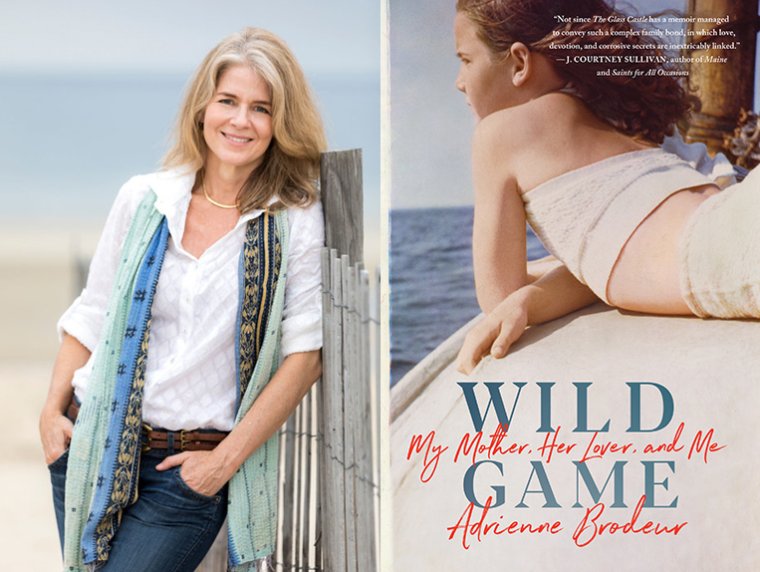This week’s installment of Ten Questions features Adrienne Brodeur, whose memoir, Wild Game: My Mother, Her Lover, and Me, is out today from Houghton Mifflin Harcourt. When Brodeur was fourteen years old, her mother woke her in the middle of the night to confess she had kissed a close family friend. Brodeur describes the intoxicating effects of being chosen as her mother’s confidante—of protecting the secret for nearly a decade—without obscuring the costs of the affair that followed. Brodeur traces her own life as much as her mother’s, and uses the past to think carefully about how to move forward in her relationship with her own daughter. Leaning into the most difficult memories, Wild Game is a testament to the possibilities of writing and art as means to find personal clarity. The novelist Ruth Ozeki describes the memoir as a “courageous act of radical self-reflection and truth telling, Brodeur untangles karmic threads that bind families together across generations.” Over the course of her career in publishing, Adrienne Brodeur has been a writer, editor, and administrator. She is the author of the novel Man Camp (Random House, 2005); she was cofounder and editor in chief of Zoetrope: All Story and an editor at Harcourt. In 2013 she joined Aspen Woods, a literary arts nonprofit, where she currently serves as executive director.

Adrienne Brodeur, author of Wild Game: My Mother, Her Lover, and Me. (Credit: Julia Comes)
1. How long did it take you to write Wild Game?
It took a lifetime to process and about two and a half years to write. With memoir, it’s less about the events of your past—the past is always there—and more about what you make of those events, your consciousness about them.
2. What was the most challenging thing about writing the book?
The most challenging thing was getting my relationship with my mother right and avoiding depicting our relationship as black-and-white. I heeded the advice of Vivian Gornick, who wrote that “for the drama to deepen, we must see the loneliness of the monster and the cunning of the innocent.” That line was taped to my computer screen as I wrote Wild Game.
3. Where, when, and how often do you write?
When I’m in the thick of a project—which currently, I’m not—I write daily in my home office. I start at 5:00 AM with a cup of strong coffee and don’t stop until my son wakes up and comes in for a snuggle, usually around 7:00 AM.
4. What is one thing that your agent or editor told you during the process of publishing this book that stuck with you?
Early on, my agent told me that I should write my memoir like I was writing a novel, scene by scene. That guidance was revelatory.
5. What are you reading right now?
I’m listening to Toni Morrison narrate Beloved on Audible, which is an amazing way to experience the poetry of her writing, and I’m reading Trick Mirror by Jia Tolentino, a lucid, bold and thought-provoking collection of essays.
6. Which author, in your opinion, deserves wider recognition?
There are many. At the top of my list is Peter Rock, who writes one strange and beautiful novel after the next.
7. How do you balance your day job with your writing?
I’m lucky to have a day job that I feel passionately about, as the executive director of Aspen Words, a literary nonprofit. I balance the two—if you can call it that—by compartmentalizing them. Typically, I’m finished writing long before my work day begins. I take a walk in between to shift gears, and then once I’m in work mode, I rarely look back.
8. If you could go back in time and talk to the earlier you, before you started Wild Game, what would you say?
I would tell myself to stop worrying about what others might think and just go for it. I would remind myself that I need to write this memoir in order to own my own story, make peace with it, and move toward a brighter future. I would tell myself that it’s going to be challenging to reveal so much about my life, but it will also be cathartic and empowering.
9. Who is your most trusted reader of your work and why?
I have many trusted readers, each of whom offered unique and thoughtful perspectives on Wild Game, making it a better book. That said, I did have one unexpectedly amazing reader—a friend who is not part of the literary community—who gave me brilliant feedback as well as encouragement when I was stuck.
10. What’s the best piece of writing advice you’ve ever heard?
Read like your work depends on it. It does.







